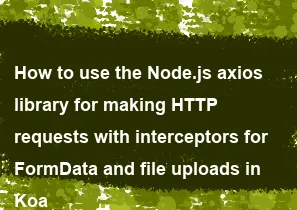How to use the Node.js axios library for making HTTP requests with interceptors for FormData and file uploads in Koa

To use the Node.js Axios library for making HTTP requests with interceptors for FormData and file uploads in a Koa application, you can create a custom interceptor to handle FormData and file uploads. Here's a guide on how to achieve this:
Install Axios:
First, make sure you have Axios installed in your project:
bashnpm install axiosSet up Axios with interceptors:
Import Axios and set up interceptors to handle FormData and file uploads:
javascriptconst axios = require('axios'); const FormData = require('form-data'); const fs = require('fs'); // Create an Axios instance with default configuration const axiosInstance = axios.create({ baseURL: 'http://api.example.com', // Replace with your API base URL timeout: 5000, // Request timeout in milliseconds }); // Add an interceptor for FormData and file uploads axiosInstance.interceptors.request.use( (config) => { // Check if request data is FormData if (config.data instanceof FormData) { // Set content type to multipart/form-data config.headers['Content-Type'] = 'multipart/form-data'; } // Check if request data contains file uploads if (config.data && config.data.files) { const formData = new FormData(); // Append file data to FormData for (const file of config.data.files) { formData.append(file.fieldname, fs.createReadStream(file.path), { filename: file.originalname, contentType: file.mimetype }); } // Append other form fields to FormData delete config.data.files; for (const key in config.data) { formData.append(key, config.data[key]); } // Override request data with FormData config.data = formData; } return config; }, (error) => { return Promise.reject(error); } );This interceptor checks if the request data is FormData or contains file uploads. If it is, it converts the data into FormData and appends file uploads to it.
Use Axios in your Koa application:
Now, you can use the
axiosInstanceto make HTTP requests within your Koa application:javascriptconst Koa = require('koa'); const app = new Koa(); // Example route handler using Axios for making HTTP requests app.use(async (ctx) => { try { // Example: Uploading files const response = await axiosInstance.post('/upload', { // Other form fields field1: 'value1', field2: 'value2', // Files files: [ { fieldname: 'file1', originalname: 'file1.txt', mimetype: 'text/plain', path: '/path/to/file1.txt' }, { fieldname: 'file2', originalname: 'file2.txt', mimetype: 'text/plain', path: '/path/to/file2.txt' } ] }); ctx.body = response.data; } catch (error) { ctx.status = error.response ? error.response.status : 500; ctx.body = error.response ? error.response.data : 'Internal Server Error'; } }); // Start the Koa application const server = app.listen(3000, () => { console.log('Koa server listening on port 3000'); });
With this setup, Axios interceptors will handle FormData and file uploads in your Koa application. Adjust the interceptor logic according to your specific requirements.
-
Popular Post
- How to optimize for Google's About This Result feature for local businesses
- How to implement multi-language support in an Express.js application
- How to handle and optimize for changes in mobile search behavior
- How to handle CORS in a Node.js application
- How to use Vue.js with a UI framework (e.g., Vuetify, Element UI)
- How to configure Laravel Telescope for monitoring and profiling API requests
- How to create a command-line tool using the Commander.js library in Node.js
- How to implement code splitting in a React.js application
- How to use the AWS SDK for Node.js to interact with various AWS services
- How to use the Node.js Stream API for efficient data processing
- How to implement a cookie parser middleware in Node.js
- How to implement WebSockets for real-time communication in React
-
Latest Post
- How to implement a dynamic form with dynamic field styling based on user input in Next.js
- How to create a custom hook for handling user interactions with the browser's device motion in Next.js
- How to create a custom hook for handling user interactions with the browser's battery status in Next.js
- How to implement a dynamic form with dynamic field visibility based on user input in Next.js
- How to implement a dynamic form with real-time collaboration features in Next.js
- How to create a custom hook for handling user interactions with the browser's media devices in Next.js
- How to use the useSWRInfinite hook for paginating data with a custom loading indicator in Next.js
- How to create a custom hook for handling user interactions with the browser's network status in Next.js
- How to create a custom hook for handling user interactions with the browser's location in Next.js
- How to implement a dynamic form with multi-language support in Next.js
- How to create a custom hook for handling user interactions with the browser's ambient light sensor in Next.js
- How to use the useHover hook for creating interactive image zoom effects in Next.js